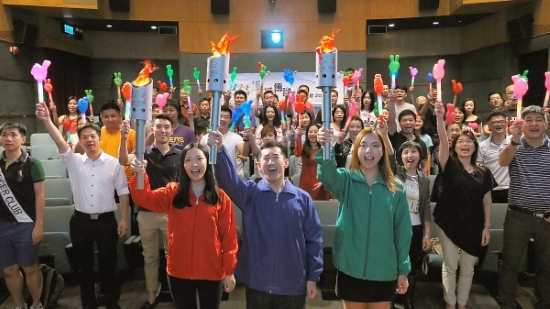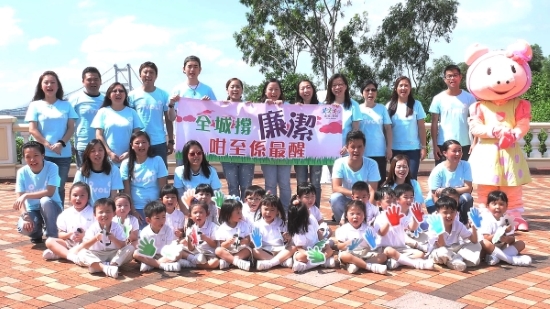專員隨筆
Commissioner Online
Together we move forward in keeping HK graft free

Rooster is a Chinese zodiac sign symbolising dawn and hopes. As we welcome the Year of the Rooster, let us take stock of achievements made in the past year and plan for an even better future.
The year 2016 saw the concerted efforts of all ICAC colleagues in taking on different challenges and overcoming various difficulties. A number of international anti-corruption surveys bore testimony to our hard efforts:
- In the 2016 Corruption Perceptions Index released by international anti-graft watchdog Transparency International (TI), Hong Kong was ranked the 15th least corrupt place among 176 countries/territories, three places up from the 18th in the previous year. Hong Kong’s score also improved from 75 in 2015 to 77 in 2016.
- According to the 2016 TRACE Matrix earlier released by renowned international anti-corruption consultancy TRACE International, Hong Kong was ranked the 4th among 199 countries and territories with the least corruption risk, maintaining the same ranking as in the previous survey. The city also registered a significant improvement in its score from 23 in the previous survey to 17 in 2016, showing a declining corruption risk.
- In its Rule of Law Index 2016 released in October last year, research institute World Justice Project ranked Hong Kong the 8th in the factor of “absence of corruption” among 113 countries and territories, two places higher than the 10th in the previous year, with its score improving from 0.84 in 2015 to 0.85 in 2016.
While these international surveys were precisely conducted, they mainly relied on data derived by gauging respondents’ perception rather than their own actual experience. The research teams might not be familiar with the anti-corruption work of individual countries or territories.
Against this background, the ICAC had invited persons-in-charge of those international organisations to visit Hong Kong in recent years, so that they could learn first-hand about its effective, time-tested strategy in fighting corruption and how Hong Kong had turned from a city once plagued by corruption to one of the cleanest metropolises in the world.
Mr José Carlos Ugaz, Chair of TI, earlier paid his debut visit to Hong Kong. He met with ICAC officers, senior government officials, academics and representatives from non-governmental organisations to learn first-hand the anti-corruption work of the city and its probity situation. Concluding his visit, Mr Ugaz praised Hong Kong for its holistic and effective three-pronged strategy of fighting corruption through investigation, prevention and education – a model for many countries and territories. He also said the city had in place an environment with a low level of corruption.

Hong Kong has long been ranked among the cleanest places in the world in the above international anti-graft surveys. This is indeed not easy to be accomplished. The rises in rankings hinge on staunch support from members of the public and efforts of all ICAC officers, and definitely should not be dismissed as “no big deal” as alleged by one of our lawmakers. Hong Kong’s rankings in those surveys may vary year on year. Despite rises in such rankings, there is no room for complacency. Instead, it is the driving force for the ICAC to continue carrying out its duty of fighting corruption proactively so as to safeguard Hong Kong’s hard-earned reputation as a clean city.
Nevertheless, some high profile ICAC cases prominently reported in the media may have inevitably influenced the public’s perception of the corruption situation, indirectly affecting the results of those surveys based on respondents’ perception. To mitigate such deviation, the ICAC has commissioned independent research agencies to conduct annual surveys since 1992. Based on respondents’ actual experience, the surveys reflect the extent of probity in Hong Kong more accurately.
According to the 2016 ICAC Annual Survey conducted through face-to-face household interviews with 1,528 randomly selected citizens, only 1.2 per cent of the respondents said they had encountered corruption in the past 12 months. This percentage was the lowest in the past three years. Perhaps, we may compare this local survey with similar surveys conducted in foreign countries.
In recent years, European Union countries had conducted similar surveys. Overall, an average of eight to nine per cent of respondents said they had encountered corruption. Taking a more detailed analysis of those surveys, we found that Sweden, Finland and the Netherlands, which have long been regarded as the cleanest places in the world, registered a figure ranging from one to two per cent, nearly the same as that of Hong Kong. In view of such survey results based on a measurement of actual experience, the extent of probity in Hong Kong is on a par with that of those cleanest countries in the world.
As the saying goes, “keeping is harder than winning”. Maintaining Hong Kong’s probity situation is no easy task. According to the latest survey on what people most wished for in the new year, most respondents said they wished for a corruption-free society. This is also the wish of everyone of us at the ICAC. Integrity and probity have become the core values and assets treasured by Hong Kong people.
It is not easy for Hong Kong, a tiny place with a dense population and a lack of natural resources, to have developed from an impoverished fishing village to an international city accommodating such global centres as finance, commerce and logistics. In addition, the city also tops the world’s competitiveness charts for a long time – a hard-earned reputation. While various factors have contributed to Hong Kong’s success story, the rule of law, fairness, justice and a graft-free society are among those fundamental pillars. They should not be taken lightly but should be treasured and safeguarded.

The 2016 ICAC Annual Survey also showed that 96.2 per cent of the respondents said the ICAC deserved their support. These respondents are indeed the ICAC’s close partners in the fight against corruption, and also the strongest driving force for us to promote our anti-graft work.
Looking ahead, 2017 will be a year of rapid changes for our society, while the public’s expectation of the ICAC will keep rising. We will continue to adopt the three-pronged strategy of fighting corruption through enforcement, prevention and education in accordance with the law and in a fair and just manner. Our determination and strength in combating corruption will never abate.
On behalf of all ICAC staff, I wish all of you a healthy and prosperous new year.

ICAC Commissioner
| Global anti-graft surveys | ||
|---|---|---|
| Organisation | Score | Ranking 【No. of countries/territories surveyed】 |
| Transparency International 2016 Corruption Perceptions Index |
77 (↑2) |
15 (↑3) 【176】 |
| TRACE International 2016 TRACE Matrix |
17* (↓6) |
4 (unchanged) 【199】 |
| World Justice Project Rule of Law Index 2016 – “Absence of corruption” |
0.85 (↑0.1) |
8 (↑2) 【113】 |


